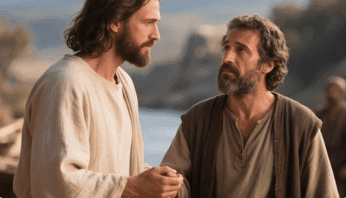Lessons from Peter’s Journey to the Sea: Trusting God Always
The story of Peter being told to go to the sea, cast in a hook, and find a coin in the mouth of the first fish he catches is one of the most fascinating miracles in the Gospels. Unlike healings, exorcisms, or multiplying food, this miracle seems almost peculiar. It is not dramatic or public, but deeply personal. It takes place after Jesus and His disciples are asked about paying the temple tax. Jesus uses this moment not only to teach about His divine identity but also to test Peter’s faith in the most unusual way. What makes this story powerful is not only the miracle itself, but the journey Peter takes as he walks toward the sea with a fishing hook in his hand, holding onto nothing but the word of Jesus.
Peter, whose name was originally Simon Bar-Jona, was known for his impulsive nature. He was quick to speak, quick to act, and often quick to doubt as well. He was the disciple who stepped out onto the water but began to sink when fear overcame him. He was the one who boldly declared Jesus as the Christ but later denied Him three times under pressure. Peter represents the struggle of the human heart: faith and doubt constantly wrestling for control. So when Jesus told him to go catch a fish and expect a coin in its mouth, we can imagine the mix of emotions swirling within him.

On one hand, Peter had seen too much to dismiss Jesus’ words. He had witnessed blind eyes opened, storms silenced, and thousands fed with only a few loaves and fish. He knew Jesus’ authority extended over creation itself. Yet on the other hand, this command must have sounded strange even to Peter. Why a coin in a fish’s mouth? Why not simply provide the money in another way, perhaps through a generous supporter or even by creating it directly? This unusual instruction challenged Peter to trust that even in the strangest of circumstances, God’s word is true.
As Peter walked toward the sea, perhaps doubts whispered in his mind. “What if I cast the line and no fish comes? What if I catch one but there’s no coin inside? What if others see me and laugh at me for following such an odd command?” These thoughts are not unlike the ones we face today when God calls us to trust Him in unusual or difficult situations. We may wonder if prayer will make a difference, if obedience will really lead to blessing, or if hope will only leave us disappointed. Faith is rarely easy, and even those who walked beside Jesus felt the pull of uncertainty.
But Peter also had memories to guide him. He may have recalled the first time Jesus told him to let down his nets after a night of catching nothing. Against his better judgment as a seasoned fisherman, Peter obeyed, and the nets overflowed with fish. That miracle changed the direction of his life, convincing him to leave everything and follow Jesus. Perhaps as he walked toward the sea with hook in hand, Peter reminded himself, “It didn’t make sense then, but it worked because He said it. If He said it again, it will work now.” This is the essence of faith: trusting God’s word even when it seems illogical.
The journey to the sea was more than a physical act; it was a test of the heart. Would Peter lean on his understanding, or would he trust the word of Christ? Faith is not measured by how much we know, but by how much we are willing to obey. Peter’s obedience shows us that real faith is not the absence of questions, but the decision to act in spite of them. Faith is moving forward with trust even when logic tells us otherwise.

When Peter reached the sea and cast in his hook, he was stepping into the unknown. Every second he waited must have felt like an eternity. Then, suddenly, he felt a tug. A fish was caught. Pulling it up, he opened its mouth, and there it was—a coin, exactly as Jesus had said. In that moment, any lingering doubts dissolved. Jesus had proven once again that His word never fails and that His provision comes in ways beyond human imagination. The miracle was not just about paying the temple tax; it was a revelation of Jesus’ authority over nature, His care for His disciples, and His ability to provide even in the smallest details.
For Peter, this moment must have been humbling. Jesus had told him that as the Son of God, He did not truly owe the tax, but He chose to pay it so as not to cause offense. Not only that, but Jesus covered Peter’s tax as well. Imagine Peter realizing that the Messiah Himself was willing to provide for him personally. This was not just a lesson about money; it was a lesson about grace. Jesus was showing Peter that He does not leave His followers to fend for themselves. He takes care of their needs, often in ways they least expect.
This story also speaks directly to us today. Like Peter, we often walk with doubts and questions. God’s instructions to us may seem unusual, or His timing may feel strange. He may call us to trust Him in ways that don’t align with our logic or experience. Yet the lesson is the same: obedience leads to provision. When God asks us to forgive when we want revenge, to give when we feel empty, to keep praying when nothing seems to change, He is inviting us to trust that His word is sure. The miracle may not look like what we expect, but it will always arrive right on time.
Another important lesson is that God provides not only in grand miracles but also in small, personal ways. Feeding thousands was a public display of power, but placing a coin in the mouth of a fish for Peter’s tax was an intimate reminder that Jesus cares about individual needs. Sometimes we think our problems are too small for God to notice, but this story reminds us that He is attentive to every detail of our lives. The same God who governs the universe is concerned with how we will pay our bills, handle our responsibilities, or overcome our daily struggles.
Peter’s walk to the sea was therefore a walk of faith, one that mirrors our own journey with God. Every step forward was a choice to believe rather than to doubt, to obey rather than to question. When he finally saw the coin, his faith was rewarded, and his obedience confirmed that God’s ways are always higher than ours. What Peter discovered is the same truth we must hold onto: faith may not always make sense, but it always makes way for God’s provision.
In the end, Peter’s doubts, fears, and questions did not define him—his obedience did. He trusted enough to act, and that made all the difference. This moment foreshadows the greater truth of the Gospel: just as Jesus paid Peter’s tax debt, He would later pay the far greater debt of sin through His death on the cross. In both cases, Jesus provided what Peter could not provide for himself. The miracle at the sea was a reminder that God’s provision is not only material but spiritual, not only temporary but eternal.

As we reflect on Peter’s journey to the sea, we are invited to examine our own journeys of faith. Where are we being called to trust God in the unusual or unexpected? Where do we struggle with doubt while holding a promise from Him? The lesson is clear: even if His instructions seem strange, even if the way forward is uncertain, His word never fails. Just as Peter found the coin exactly where Jesus said it would be, we too will find God’s provision exactly where He promises—if only we trust and obey.
